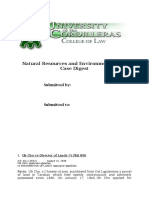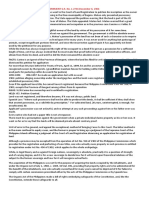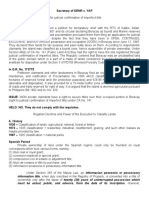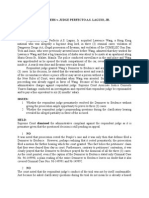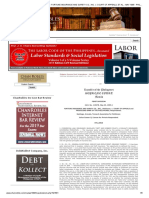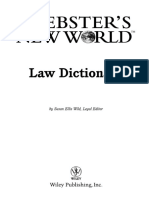0 ratings0% found this document useful (0 votes)
19 viewsOh Cho V. The Director of Lands G.R. NO. 48321. AUGUST 31, 1946
Oh Cho V. The Director of Lands G.R. NO. 48321. AUGUST 31, 1946
Uploaded by
Kristelle TThis case concerns an appeal from a judgment denying an application for exemption from agrarian reform coverage of a 17.4892-hectare landholding in Batangas City. The landowner claimed the land was reserved for residential since 1982. However, government offices found the land was classified as agricultural and reserved for residential until 1994, meaning it was still covered by agrarian reform. While a 1982 zoning ordinance classified it as agricultural reserved for residential, it was not until 1994 that it was explicitly classified as residential. The Office of the President and Court of Appeals affirmed the denial, finding the land was devoted to agricultural activities prior to 1994.
Copyright:
© All Rights Reserved
Available Formats
Download as PDF, TXT or read online from Scribd
Oh Cho V. The Director of Lands G.R. NO. 48321. AUGUST 31, 1946
Oh Cho V. The Director of Lands G.R. NO. 48321. AUGUST 31, 1946
Uploaded by
Kristelle T0 ratings0% found this document useful (0 votes)
19 views5 pagesThis case concerns an appeal from a judgment denying an application for exemption from agrarian reform coverage of a 17.4892-hectare landholding in Batangas City. The landowner claimed the land was reserved for residential since 1982. However, government offices found the land was classified as agricultural and reserved for residential until 1994, meaning it was still covered by agrarian reform. While a 1982 zoning ordinance classified it as agricultural reserved for residential, it was not until 1994 that it was explicitly classified as residential. The Office of the President and Court of Appeals affirmed the denial, finding the land was devoted to agricultural activities prior to 1994.
Original Title
LTD-2
Copyright
© © All Rights Reserved
Available Formats
PDF, TXT or read online from Scribd
Share this document
Did you find this document useful?
Is this content inappropriate?
This case concerns an appeal from a judgment denying an application for exemption from agrarian reform coverage of a 17.4892-hectare landholding in Batangas City. The landowner claimed the land was reserved for residential since 1982. However, government offices found the land was classified as agricultural and reserved for residential until 1994, meaning it was still covered by agrarian reform. While a 1982 zoning ordinance classified it as agricultural reserved for residential, it was not until 1994 that it was explicitly classified as residential. The Office of the President and Court of Appeals affirmed the denial, finding the land was devoted to agricultural activities prior to 1994.
Copyright:
© All Rights Reserved
Available Formats
Download as PDF, TXT or read online from Scribd
Download as pdf or txt
0 ratings0% found this document useful (0 votes)
19 views5 pagesOh Cho V. The Director of Lands G.R. NO. 48321. AUGUST 31, 1946
Oh Cho V. The Director of Lands G.R. NO. 48321. AUGUST 31, 1946
Uploaded by
Kristelle TThis case concerns an appeal from a judgment denying an application for exemption from agrarian reform coverage of a 17.4892-hectare landholding in Batangas City. The landowner claimed the land was reserved for residential since 1982. However, government offices found the land was classified as agricultural and reserved for residential until 1994, meaning it was still covered by agrarian reform. While a 1982 zoning ordinance classified it as agricultural reserved for residential, it was not until 1994 that it was explicitly classified as residential. The Office of the President and Court of Appeals affirmed the denial, finding the land was devoted to agricultural activities prior to 1994.
Copyright:
© All Rights Reserved
Available Formats
Download as PDF, TXT or read online from Scribd
Download as pdf or txt
You are on page 1of 5
OH CHO V.
THE DIRECTOR OF LANDS
G.R. NO. 48321. AUGUST 31, 1946
PADILLA, J:
FACTS:
This is an appeal from a judgment decreeing the registration of a residential lot located in
the municipality of Guinayangan, Province of Tayabas, in the name of the applicant.
The opposition of the Director of Lands is based on the applicant's lack of title to the lot, and
on his disqualification, as alien, from acquiring lands of the public domain.
The applicant, who is an alien, and his predecessors in interest have been in open,
continuous, exclusive and notorious possession of the lot from 1880 to the filing of the
application for registration on January 17, 1940.
All lands that were not acquired from the Government, either by purchase or by grant, belong
to the public domain. An exception to the rule would be any land that should have been in
the possession of an occupant and of his predecessors in interest since time immemorial, for
such possession would justify the presumption that the land had never been part of the public
domain or that it had been a private property even before the Spanish conquest. (Carino v.
Insular Government) The applicant does not come under the exception, for the earliest
possession of the lot by his first predecessor in interest began in 1880.
ISSUE:
Whether or not the applicant is entitled to a decree of registration thereof under the
provisions of the Public Land Act (C. A. No. 141).
HELD:
No. Under the provisions of the Act invoked by the applicant, he is not entitled to a decree of
registration of the lot, because he is an alien disqualified from acquiring lands of the public
domain (Sections 48, 49, C. A. No. 141).
It may be argued that under the provisions of the Public Land Act the applicant's immediate
predecessors in interest would have been entitled to a decree of registration of the lot had
they applied for its registration; and that he having purchased or acquired it, the right of his
immediate predecessors in interest to a decree of registration must be deemed also to have
been acquired by him. The benefits provided in the Public Land Act for applicant's immediate
predecessors in interest are or constitute a grant or concession by the State; and before they
could acquire any right under such benefits, the applicant's immediate predecessors in
interest should comply with the condition precedent for the grant of such benefits. The
condition precedent is to apply for the registration of the land of which they had been in
possession at least since July 26, 1894. This the applicant's immediate predecessors in
interest failed to do.
Accordingly, judgment is reversed and the application for registration dismissed, without
costs.
CARIÑO V. INSULAR GOVERNMENT OF PHILIPPINE ISLANDS
212 U.S. 449. FEBRUARY 23, 1909
MR. JUSTICE HOLMES:
FACTS:
The applicant and plaintiff in error is an Igorot of the Province of Benguet, where the land
lies. For more than fifty years before the Treaty of Paris, April 11, 1899, as far back as the
findings go, the plaintiff and his ancestors had held the land as owners. His grandfather had
lived upon it, and had maintained fences sufficient for the holding of cattle, according to the
custom of the country, some of the fences, it seems, having been of much earlier date. His
father had cultivated parts and had used parts for pasturing cattle, and he had used it for
pasture in his turn. They all had been recognized as owners by the Igorots, and he had
inherited or received the land from his father in accordance with Igorot custom. No document
of title, however, had issued from the Spanish Crown, and although, in 1893-1894 and again in
1896-1897, he made application for one under the royal decrees then in force, nothing seems
to have come of it. In 1901, the plaintiff filed a petition, alleging ownership, under the
mortgage law, and the lands were registered to him, that process, however, establishing only
a possessory title, it is said.
The proceeding for registration is likened to bills in equity to quiet title, but it is different in
principle. It is a proceeding in rem under a statute of the type of the Torrens Act.
ISSUES:
1. Whether or not that even if the applicant have title, he cannot have it registered, because
the Philippine Commission's Act No. 926, of 1903, excepts the Province of Benguet among
others from its operation.
2. Whether or not the plaintiff owns the land.
HELD:
1. No. Act No. 926 deals with the acquisition of new titles by homestead entries, purchase,
etc., and the perfecting of titles begun under the Spanish law. The applicant's claim is that he
now owns the land, and is entitled to registration under the Philippine Commission's Act No.
496, of 1902, which established a court for that purpose with jurisdiction "throughout the
Philippine Archipelago," and authorized in general terms applications to be made by persons
claiming to own the legal estate in fee simple, as the applicant does. He is entitled to
registration if his claim of ownership can be maintained.
2. Yes. The Province of Benguet was inhabited by a tribe that the Solicitor General, in his
argument, characterized as a savage tribe that never was brought under the civil or military
government of the Spanish Crown. Whatever may have been the technical position of Spain, it
does not follow that, in the view of the United States, he had lost all rights and was a mere
trespasser when the present government seized his land.
The acquisition of the Philippines was not like the settlement of the white race in the United
States. Our first object in the internal administration of the islands is to do justice to the
natives, not to exploit their country for private gain. By the Organic Act of July 1, 1902, all
the property and rights acquired there by the United States are to be administered "for the
benefit of the inhabitants thereof."
When, as far back as testimony or memory goes, the land has been held by individuals under a
claim of private ownership, it will be presumed to have been held in the same way from
before the Spanish conquest, and never to have been public land. Certainly, in a case like
this, if there is doubt or ambiguity in the Spanish law, we ought to give the applicant the
benefit of the doubt.
If the applicant's case is to be tried by the law of Spain, we do not discover such clear proof
that it was bad by that law as to satisfy us that he does not own the land. To begin with, the
older decrees and laws cited by the counsel for the plaintiff in error seem to indicate pretty
clearly that the natives were recognized as owning some lands, irrespective of any royal
grant. In other words, Spain did not assume to convert all the native inhabitants of the
Philippines into trespassers, or even into tenants at will.
Prescription is mentioned again in the royal cedula of October 15, 1754, cited in 3 Phil. 546:
"Where such possessors shall not be able to produce title deeds, it shall be sufficient if they
shall show that ancient possession, as a valid title by prescription."
The question comes, however, on the decree of June 25, 1880, for the adjustment of royal
lands wrongfully occupied by private individuals in the Philippine Islands. This begins with the
usual theoretic assertion that, for private ownership, there must have been a grant by
competent authority; but instantly descends to fact by providing that, for all legal effects,
those who have been in possession for certain times shall be deemed owners. It does not
appear that this land ever was royal land or wrongfully occupied. The applicant's possession
was not unlawful, and no attempt at any such proceedings against him or his father ever was
made.
The royal decree of February 13, 1894, declaring forfeited titles that were capable of
adjustment under the decree of 1880, for which adjustment had not been sought, should not
be construed as a confiscation, but as the withdrawal of a privilege. As a matter of fact, the
applicant never was disturbed.
We are of opinion that law and justice require that the applicant should be granted what he
seeks, and should not be deprived of what, by the practice and belief of those among whom
he lived, was his property, through a refined interpretation of an almost forgotten law of
Spain.
ALANGILAN REALTY & DEVELOPMENT CORPORATION V. OFFICE OF THE PRESIDENT
G.R. NO. 180471. MARCH 26, 2010
NACHURA, J:
FACTS:
Petitioner is the owner/developer of a 17.4892-hectare land in Barangays Alangilan and Patay
in Batangas City (Alangilan landholding). On August 7, 1996, petitioner filed an Application
and/or Petition for Exclusion/Exemption from Comprehensive Agrarian Reform Program
(CARP) Coverage of the Alangilan landholding with the Municipal Agrarian Reform Office
(MARO) of the Department of Agrarian Reform (DAR). It averred that, in 1982, the subject
landholding was classified as reserved for residential.
The DAR Secretary noted that, as of February 15, 1993, the Alangilan landholding remained
agricultural, reserved for residential. It was classified as residential-1 only on December 12,
1994. The qualifying phrase reserved for residential means that the property is still classified
as agricultural, and is covered by the CARP.
The previous zoning ordinance, i.e. the Batangas City Zoning Ordinance approved under HSRC
Resolution No. R-92, series of 1982, dated 6 October 1982, classified the said landholding as
"Agricultural, Reserved for Residential." It was Ordinance No. 3, series of 1994 that explicitly
classified the area as "Residential- 1."
On appeal, the Office of the President (OP) affirmed the decision of the DAR Secretary. On
August 28, 2007, the CA dismissed the petition. The CA noted the report of MARO, Provincial
Agrarian Reform Office (PARO), and Regional Agrarian Reform Office (RARO) that the Alangilan
landholding was devoted to agricultural activities prior to the effectivity of the CARP on June
15, 1988 and even thereafter.
ISSUE:
Whether or not Petitioner's Alangilan landholding is subject to the coverage of the
comprehensive agrarian reform law, notwithstanding that the property has been converted to
non-agricultural uses by the zoning ordinance of the city of Batangas prior to the law.
HELD:
Yes. Indeed, lands devoted to non-agricultural activity are outside the coverage of CARL.
These include lands previously converted into non-agricultural uses prior to the effectivity of
the CARL on June 15, 1988.
It is beyond cavil that the Alangilan landholding was classified as agricultural, reserved for
residential in 1982, and was reclassified as residential-1 in 1994. In this case, petitioner failed
to establish that the subject landholding had already been converted into residential use prior
to June 15, 1988. We also note that the subject landholding was still being utilized for
agricultural activities at the time of the filing of the application for exemption.
Not having been converted into, or classified as, residential before June 15, 1988, the
Alangilan landholding is, therefore, covered by the CARP. The subsequent reclassification of
the landholding as residential-1 in 1994 cannot place the property outside the ambit of the
CARP, because there is no showing that the DAR Secretary approved the reclassification.
JOSE LUIS ROS V. DEPARTMENT OF AGRARIAN REFORM
G.R. NO. 132477. AUGUST 31, 2005
CHICO-NAZARIO, J:
FACTS:
Petitioners are the owners/developers of several parcels of land located in Arpili, Balamban,
Cebu. By virtue of Municipal Ordinance No. 101 passed by the Municipal Council of Balamban,
Cebu, these lands were reclassified as industrial lands. As part of their preparation for the
development of the subject lands as an industrial park, petitioners secured all the necessary
permits and appropriate government certifications. DAR was disallowing the conversion of the
subject lands for industrial use and directed him to cease and desist from further
developments on the land.
ISSUE:
Whether or not the reclassification of the subject lands to industrial use by the Municipality
of Balamban, Cebu pursuant to its authority under Section 20(a) of Republic Act No. 7160 or
the Local Government Code of 1991 (the "LGC") has the effect of taking such lands out of the
coverage of the CARL and beyond the jurisdiction of the DAR.
HELD:
No. After the passage of Republic Act No. 6657, otherwise known as Comprehensive Agrarian
Reform Program, agricultural lands, though reclassified, have to go through the process of
conversion, jurisdiction over which is vested in the DAR. However, agricultural lands already
reclassified before the effectivity of Rep. Act No. 6657 are exempted from conversion.
As held in Alarcon v. Court of Appeals, the subject landholding was merely reclassified.
Conversion is different from reclassification. Conversion is the act of changing the current use
of a piece of agricultural land into some other use as approved by the Department of Agrarian
Reform. Reclassification, on the other hand, is the act of specifying how agricultural lands
shall be utilized for non-agricultural uses such as residential, industrial, commercial, as
embodied in the land use plan, subject to the requirements and procedure for land use
conversion.
Municipal Ordinance No. 101 of Balamban, Cebu, which reclassified the subject lands, was
passed on 25 March 1992, and Provincial Ordinance No. 95-8 of the Provincial Board of Cebu,
which adopted Municipal Ordinance No. 101, was passed on 03 April 1995, long after Rep. Act
No. 6657 has taken effect.
We reiterate the view that with respect to conversions of agricultural lands covered by R.A.
No. 6657 to non-agricultural uses, the authority of DAR to approve such conversions may be
exercised from the date of the law's effectivity on June 15, 1988 (Advincula-Velasquez v.
Court of Appeals).
The authority of the DAR to approve conversions of agricultural lands covered by Rep. Act No.
6657 to non-agricultural uses has not been pierced by the passage of the Local Government
Code. The Code explicitly provides that "nothing in this section shall be construed as
repealing or modifying in any manner the provisions of Rep. Act No. 6657."
WHEREFORE, premises considered, the instant petition is DENIED for lack of merit.
You might also like
- MCQs On Official Language Act 1963Document5 pagesMCQs On Official Language Act 1963Kapil Kumar100% (2)
- Case Digest NatresDocument20 pagesCase Digest NatresKing RodilNo ratings yet
- Oh Cho vs. Director of Lands 75 PHIL 890Document31 pagesOh Cho vs. Director of Lands 75 PHIL 890FD BalitaNo ratings yet
- Carino vs. Insular Govt.Document4 pagesCarino vs. Insular Govt.Guiller C. MagsumbolNo ratings yet
- Carino Vs Insular Govt. Case DigestDocument2 pagesCarino Vs Insular Govt. Case DigestShielaLyn RiveraNo ratings yet
- Applicant-Appellee Vs Vs Oppositor-Appellant Solicitor General Roman Ozaeta Assistant Solicitor General Rafael Amparo, Vicente Constantino, Ferrier, Gomez & Sotelo J.T. Chuidian As Amici CuriaeDocument21 pagesApplicant-Appellee Vs Vs Oppositor-Appellant Solicitor General Roman Ozaeta Assistant Solicitor General Rafael Amparo, Vicente Constantino, Ferrier, Gomez & Sotelo J.T. Chuidian As Amici CuriaeEm DraperNo ratings yet
- Carino vs. Insular GovernmentDocument3 pagesCarino vs. Insular GovernmentRyan Cruz IINo ratings yet
- Land Title and Deeds CasesDocument3 pagesLand Title and Deeds CasesRoyalhighness18No ratings yet
- Lee Hong Kok V David 48 SCRA 372 Facts:: Imperium, Dominium, Jura RegaliaDocument62 pagesLee Hong Kok V David 48 SCRA 372 Facts:: Imperium, Dominium, Jura RegaliaAlayka A AnuddinNo ratings yet
- LTD Cases First BatchDocument45 pagesLTD Cases First BatchKaren Patricio LusticaNo ratings yet
- Land Titles and Deeds Case DigestDocument6 pagesLand Titles and Deeds Case DigestZeawea100% (1)
- Constitutional Provisions CasesDocument5 pagesConstitutional Provisions CasesRyan JD LimNo ratings yet
- Carino vs. Insular GovernmentDocument2 pagesCarino vs. Insular GovernmentKya CabsNo ratings yet
- NATRES - Finals CasesDocument86 pagesNATRES - Finals CasesRcl ClaireNo ratings yet
- Carino Vs Insular GovtDocument2 pagesCarino Vs Insular GovtRobelle RizonNo ratings yet
- OH CHO Vs Director of Lands Case Digest GR No L-48321Document19 pagesOH CHO Vs Director of Lands Case Digest GR No L-48321Case Digest CompilationNo ratings yet
- Natural Resources and Environmental Law Case Digest: Submitted byDocument27 pagesNatural Resources and Environmental Law Case Digest: Submitted bybumbleNo ratings yet
- Case Digests For LTDDocument5 pagesCase Digests For LTDpantewNo ratings yet
- Agra Cases SyllabusDocument169 pagesAgra Cases SyllabusMary Fatima BerongoyNo ratings yet
- Mateo Cariño Vs The Insular GovernmentDocument11 pagesMateo Cariño Vs The Insular GovernmentVaness MendezNo ratings yet
- Nat-Res Cases 1Document43 pagesNat-Res Cases 1Rikki Marie PajaresNo ratings yet
- OH CHO, Applicant-Appellee, vs. THE DIRECTOR OF LANDS, Oppositor-Appellant. G.R. No. L-48321 August 31, 1946 Padilla, J.Document20 pagesOH CHO, Applicant-Appellee, vs. THE DIRECTOR OF LANDS, Oppositor-Appellant. G.R. No. L-48321 August 31, 1946 Padilla, J.Maricar Corina CanayaNo ratings yet
- Carino V Insular GovernmentDocument7 pagesCarino V Insular GovernmenttheresagriggsNo ratings yet
- Cariño v. Insular GovernmentDocument5 pagesCariño v. Insular GovernmentJuris PrudenceNo ratings yet
- Republic VS Santos (G.r. No. 160453 November 12, 2012)Document37 pagesRepublic VS Santos (G.r. No. 160453 November 12, 2012)DaveKarlRamada-MaraonNo ratings yet
- Dir of LandsDocument9 pagesDir of LandsakosikatkatNo ratings yet
- Carino vs. Insular Government (212 U.S. 449,1909)Document5 pagesCarino vs. Insular Government (212 U.S. 449,1909)Claire CaceresNo ratings yet
- Secretary of DENR V Yap DigestedDocument4 pagesSecretary of DENR V Yap DigestedMark Anthony Sañosa ArancinaNo ratings yet
- Module 6: Indigenous Peoples: (Chap. 3, Secs. 4-12)Document17 pagesModule 6: Indigenous Peoples: (Chap. 3, Secs. 4-12)Andrea Gural De GuzmanNo ratings yet
- Oh Cho Vs Director of Lands GDocument6 pagesOh Cho Vs Director of Lands Gmin bullanNo ratings yet
- 4 NATRES Case OH Cho vs. Dir. of LandsDocument18 pages4 NATRES Case OH Cho vs. Dir. of LandsEds NatividadNo ratings yet
- Oh Cho vs. Director of LandsDocument14 pagesOh Cho vs. Director of LandsLaila Ismael SalisaNo ratings yet
- Carino vs. Insular Government 1909Document2 pagesCarino vs. Insular Government 1909Charlyn SabioNo ratings yet
- Lee Hong Hok v. David: Sales PatentDocument36 pagesLee Hong Hok v. David: Sales PatentGreggy BoyNo ratings yet
- Lee Hong Hok v. David: Sales PatentDocument36 pagesLee Hong Hok v. David: Sales PatentGreggy BoyNo ratings yet
- Digested LTDDocument7 pagesDigested LTDJaniceNo ratings yet
- Natres DigestDocument3 pagesNatres DigestRcl ClaireNo ratings yet
- CASE No, 1. Secretary of DENR vs. Mayor Yap G.R. No. 167707, October 8, 2008Document7 pagesCASE No, 1. Secretary of DENR vs. Mayor Yap G.R. No. 167707, October 8, 2008Nikko EchegorinNo ratings yet
- Palanca vs. RepublicDocument3 pagesPalanca vs. RepublicBEN DONGLAYANNo ratings yet
- Carino v. Insular GovernmentDocument1 pageCarino v. Insular GovernmentErikha AranetaNo ratings yet
- Oh Cho Vs Director of Lands G.R. No. 48321, August 31, 1946Document3 pagesOh Cho Vs Director of Lands G.R. No. 48321, August 31, 1946Jhoanne Macarasig NavarroNo ratings yet
- 1 Cariño Vs Insular GovernmentDocument4 pages1 Cariño Vs Insular GovernmentBryne BoishNo ratings yet
- Case DigestsDocument13 pagesCase DigestsSheila G. DolipasNo ratings yet
- LAW About CIVIL-751-800Document50 pagesLAW About CIVIL-751-800Tin TinNo ratings yet
- Oh Cho Vs Director of LandsDocument19 pagesOh Cho Vs Director of LandsNiehr RheinNo ratings yet
- Oh Cho Vs Director of LandsDocument13 pagesOh Cho Vs Director of LandsJessamine RañaNo ratings yet
- Carino v. CADocument6 pagesCarino v. CARYWELLE BRAVONo ratings yet
- Carino v. Insular Govt 212 U.S. 449 (1909)Document3 pagesCarino v. Insular Govt 212 U.S. 449 (1909)Wendy PeñafielNo ratings yet
- Lands-Classification of Lands of Public DomainDocument7 pagesLands-Classification of Lands of Public DomainNullus cumunisNo ratings yet
- Oh Cho Vs Director of LandsDocument21 pagesOh Cho Vs Director of LandsEds NatividadNo ratings yet
- Land Titles and Deeds CasesDocument11 pagesLand Titles and Deeds CasesClark LimNo ratings yet
- LTD Up To Chap 2Document11 pagesLTD Up To Chap 2dianne rosalesNo ratings yet
- Juan Ibañez de Alcoa v. The Insular GovernmentDocument7 pagesJuan Ibañez de Alcoa v. The Insular GovernmentiamchurkyNo ratings yet
- Economic and Social Rights Full Text CasesDocument449 pagesEconomic and Social Rights Full Text CasesMelanie Graile TumaydanNo ratings yet
- Economic and Social Rights Digested CasesDocument15 pagesEconomic and Social Rights Digested CasesMelanie Graile TumaydanNo ratings yet
- LTD 2016 FRD Part 1Document52 pagesLTD 2016 FRD Part 1NingClaudioNo ratings yet
- Delos Reyes vs. Ramolete G.R. No. L-47331. June 21, 1983Document13 pagesDelos Reyes vs. Ramolete G.R. No. L-47331. June 21, 1983Ma. Nicolai TorresNo ratings yet
- Secretary of The DENR vs. Yap (2008)Document7 pagesSecretary of The DENR vs. Yap (2008)Shane Fulgueras100% (1)
- LTD CasesDocument13 pagesLTD CasesAdrian Paul MabatanNo ratings yet
- LTD Case Digests Part 1Document10 pagesLTD Case Digests Part 1Owen BuenaventuraNo ratings yet
- Post Capitulation Trinidad (1797–1947): Aspects of the Laws, the Judicial System, and the GovernmentFrom EverandPost Capitulation Trinidad (1797–1947): Aspects of the Laws, the Judicial System, and the GovernmentNo ratings yet
- 3a. Magna Carta For PWD - TabaoDocument9 pages3a. Magna Carta For PWD - TabaoKristelle TNo ratings yet
- Petitioner Vs Vs Respondent: Second DivisionDocument5 pagesPetitioner Vs Vs Respondent: Second DivisionKristelle TNo ratings yet
- 66 Alarcon - v. - Court - of - Appeals PDFDocument7 pages66 Alarcon - v. - Court - of - Appeals PDFKristelle TNo ratings yet
- Petitioner vs. VS.: Second DivisionDocument6 pagesPetitioner vs. VS.: Second DivisionKristelle TNo ratings yet
- Petitioner vs. vs. Respondents: First DivisionDocument3 pagesPetitioner vs. vs. Respondents: First DivisionKristelle T100% (1)
- Plaintiff-Appellant Vs Vs Defendant-Appellee Honorio Valisno Garcia I Felipe K. MedinaDocument4 pagesPlaintiff-Appellant Vs Vs Defendant-Appellee Honorio Valisno Garcia I Felipe K. MedinaKristelle TNo ratings yet
- 13 Republic - v. - Sandiganbayan PDFDocument59 pages13 Republic - v. - Sandiganbayan PDFKristelle TNo ratings yet
- Petitioner Vs Vs Respondents: en BancDocument11 pagesPetitioner Vs Vs Respondents: en BancKristelle TNo ratings yet
- Petitioner vs. vs. Respondents: Second DivisionDocument5 pagesPetitioner vs. vs. Respondents: Second DivisionKristelle TNo ratings yet
- 113957-2002-People v. Robi Os y Domingo PDFDocument12 pages113957-2002-People v. Robi Os y Domingo PDFKristelle TNo ratings yet
- 02 Lopez - v. - Senate - of - The - Philippines PDFDocument61 pages02 Lopez - v. - Senate - of - The - Philippines PDFKristelle TNo ratings yet
- Executive DigestsDocument31 pagesExecutive DigestsKristelle TNo ratings yet
- 15 Funa - v. - Executive - SecretaryDocument18 pages15 Funa - v. - Executive - SecretaryKristelle TNo ratings yet
- 05 Osmeña - v. - COMELECDocument15 pages05 Osmeña - v. - COMELECKristelle TNo ratings yet
- 06 Forbes - v. - Chuoco - Tiaco PDFDocument67 pages06 Forbes - v. - Chuoco - Tiaco PDFKristelle TNo ratings yet
- Petitioner Vs Vs Respondents: en BancDocument7 pagesPetitioner Vs Vs Respondents: en BancKristelle TNo ratings yet
- #82 - US v. AbiogDocument1 page#82 - US v. AbiogGenerousdeGuzmanNo ratings yet
- Verified Petition - Provincial Assessor - Chumawin.9.4.2020Document5 pagesVerified Petition - Provincial Assessor - Chumawin.9.4.2020black stalkerNo ratings yet
- Indiana Consolidated Insurance Co. v. MathewDocument2 pagesIndiana Consolidated Insurance Co. v. MathewcrlstinaaaNo ratings yet
- C: UNR Rao V Indira Gandhi (1971) 2 SCC 63: Resident OF NdiaDocument3 pagesC: UNR Rao V Indira Gandhi (1971) 2 SCC 63: Resident OF NdiaKinaya ChandraNo ratings yet
- Espano Vs CADocument3 pagesEspano Vs CAMa Gabriellen Quijada-TabuñagNo ratings yet
- Advocates Remuneration Order 2011Document45 pagesAdvocates Remuneration Order 2011Aqua Lake33% (3)
- National Marketing Corp Vs Tecson GR L-29131Document2 pagesNational Marketing Corp Vs Tecson GR L-29131Jonjon BeeNo ratings yet
- Group 3 PDFDocument12 pagesGroup 3 PDFPatricia RodriguezNo ratings yet
- Allan Regala, Petitioner, vs. Manila Hotel Corporation, Respondent.Document13 pagesAllan Regala, Petitioner, vs. Manila Hotel Corporation, Respondent.christian villamanteNo ratings yet
- Arbitral ImmunityDocument4 pagesArbitral ImmunityjdNo ratings yet
- GPR 312: Alternative Dispute Resolution Law G34/135786/2019 Question OneDocument10 pagesGPR 312: Alternative Dispute Resolution Law G34/135786/2019 Question Oneericosim ricoNo ratings yet
- LOPEZ V ECCDocument2 pagesLOPEZ V ECCclarisse lyka hatton0% (1)
- G.R. No. L-38745 August 6, 1975 Doctrine: No Interest Shall Be Due Unless It Has Been Expressly Stipulated in WritingDocument1 pageG.R. No. L-38745 August 6, 1975 Doctrine: No Interest Shall Be Due Unless It Has Been Expressly Stipulated in WritingKaren Ryl Lozada BritoNo ratings yet
- Case 1 - G.R. No. 157286Document3 pagesCase 1 - G.R. No. 157286Novem MontesorNo ratings yet
- Barbers v. LaguioDocument2 pagesBarbers v. LaguioA CybaNo ratings yet
- Formal Offer of Exhibit ADm. 0001Document2 pagesFormal Offer of Exhibit ADm. 0001Randy Sioson100% (1)
- Joseph Regalado Vs de La Pena, G.R. No. 202448Document4 pagesJoseph Regalado Vs de La Pena, G.R. No. 202448MhaliNo ratings yet
- 11 People V WagasDocument4 pages11 People V WagasRonnieNo ratings yet
- G3. Tobias v. Abalos 239 SCRA 106Document1 pageG3. Tobias v. Abalos 239 SCRA 106ImmediateFalcoNo ratings yet
- PFR Cases - Full TextDocument190 pagesPFR Cases - Full TextNafiesa ImlaniNo ratings yet
- 4 Jardine Davies Insurance Brokerage v. AliposaDocument4 pages4 Jardine Davies Insurance Brokerage v. AliposaFrancis Leo TianeroNo ratings yet
- Article 49 EU Charter of Fundamental RightsDocument2 pagesArticle 49 EU Charter of Fundamental RightsAndreea UlmeanuNo ratings yet
- Fortune Insurance and Surety Co., Inc. vs. CADocument6 pagesFortune Insurance and Surety Co., Inc. vs. CARamon Joma BungabongNo ratings yet
- Wa0006Document1 pageWa0006NasirMahmoodNo ratings yet
- Letlet CarpioDocument2 pagesLetlet CarpioHeaven ScentsNo ratings yet
- Mercy PetitionDocument4 pagesMercy PetitionnilayabhishekNo ratings yet
- Alcaration Vs GatmaitanDocument10 pagesAlcaration Vs GatmaitanDanger EnriquezNo ratings yet
- Vigo County Jail LawsuitDocument4 pagesVigo County Jail LawsuitIndiana Public Media NewsNo ratings yet
- 166 PDFDocument332 pages166 PDFShota IasashviliNo ratings yet
















